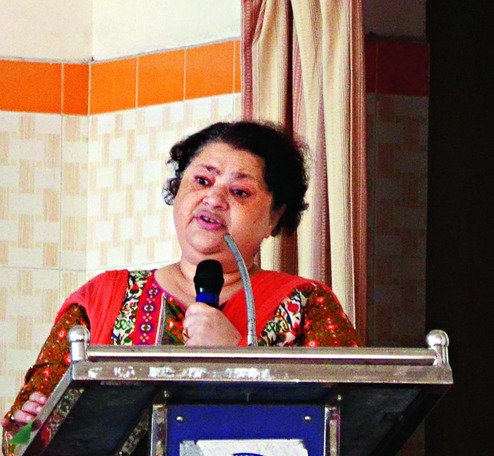
Dr Elizabeth Davis addresses the workshop in Kanke, Ranchi, on Tuesday. Telegraph picture
Suicide is a leading cause of death among students, and teachers - like parents - should learn to read warning signs, psychologists and psychiatrists told a prevention workshop in Ranchi on Tuesday.
Around 50-odd teachers from 11 capital schools attended the three-hour programme from 10am organised by Rotary Club (Ranchi) at AB Davis Memorial Hall in Kanke in an extended observance of the World Suicide Prevention Day, which was on September 10.
Noted child psychologist Nina Agrawal, one of the guest speakers, advised teachers never to demoralise a student for scoring low in exams and to devote more time on introverts.
'If you find a child sitting alone in the classroom or unable to blend in, don't neglect him or her. Talk and try to get to the root of the problem. Try to motivate him or her to perform well in the next test,' she said, addressing the suicide prevention workshop themed Take a Minute, Change a Life.
Secretary of Rotary Club Jaideep Chadha said 8 lakh people killed themselves every year, a big percentage of them children, and up to 25 times that number made an attempt.
'A suicidal person may or may not ask for help, but that does not mean that help isn't wanted. People who take their lives don't want to die; they just want to stop hurting,' Chadha said.
Dr Elizabeth Davis, a psychiatrist from Davis Institute of Neuropsychiatry on Kanke Road, had a word of advice for a section of media that is often guilty of sensationalising tragedies.
'Splashing someone's death wish in newspapers is not prudent. It can drive others to suicide. Publishing the picture of a (person who committed) suicide is not always sensitive. In case there is a love angle involved, it is wiser not to publish names,' she said.
Dr Nishant Goyel from Central Institute of Psychiatry discussed the warning signs and steps needed to prevent it.
'Talking about suicide, seeking lethal means, preoccupation with death, no hope for the future and self-hatred are among the tell-tale signs. To curb someone's death wish communication - listening to be precise - is most important while professional help can be among the last resort,' Goyel said.
Other speakers pointed out that since children spend a substantial part of their day in schools under the supervision of teachers, a support system must exist in schools.
School staff should work to create an environment where students feel safe sharing information. School psychologists and other crisis response personnel must be trained to intervene when a student is identified as at risk of suicide, they said.










